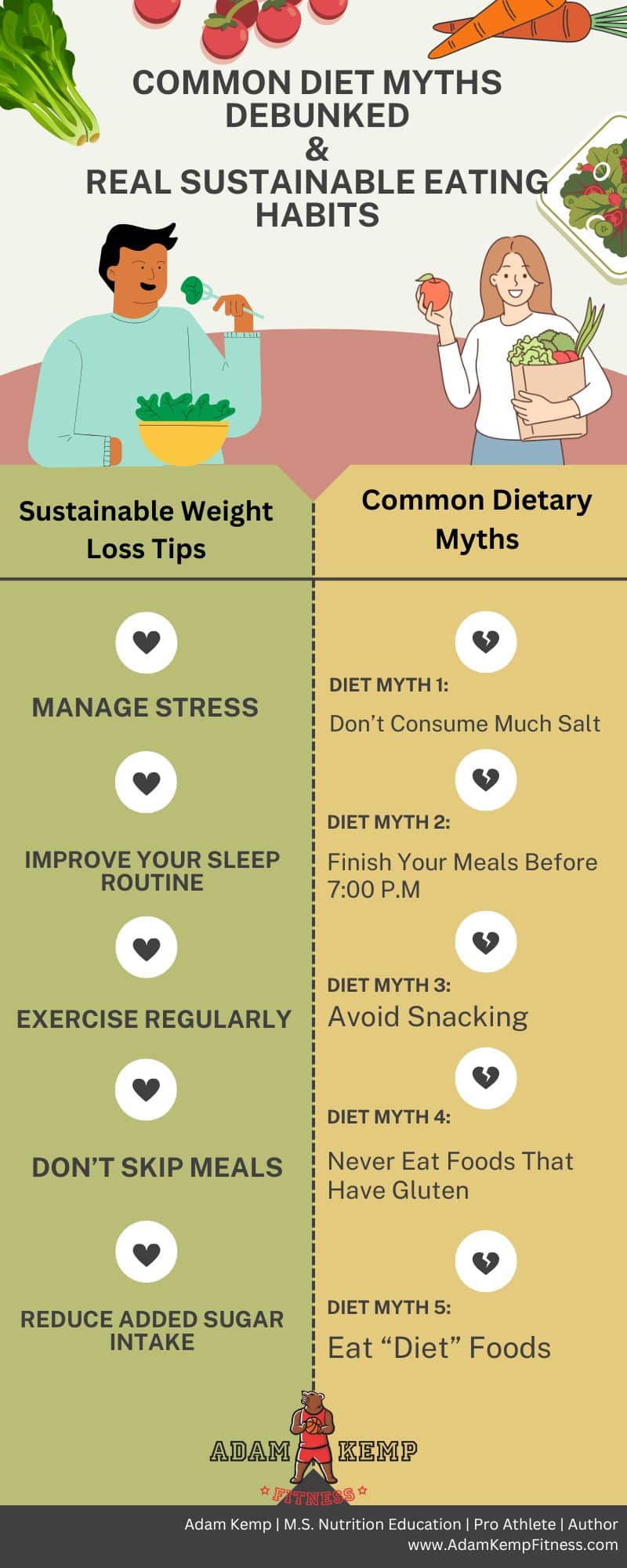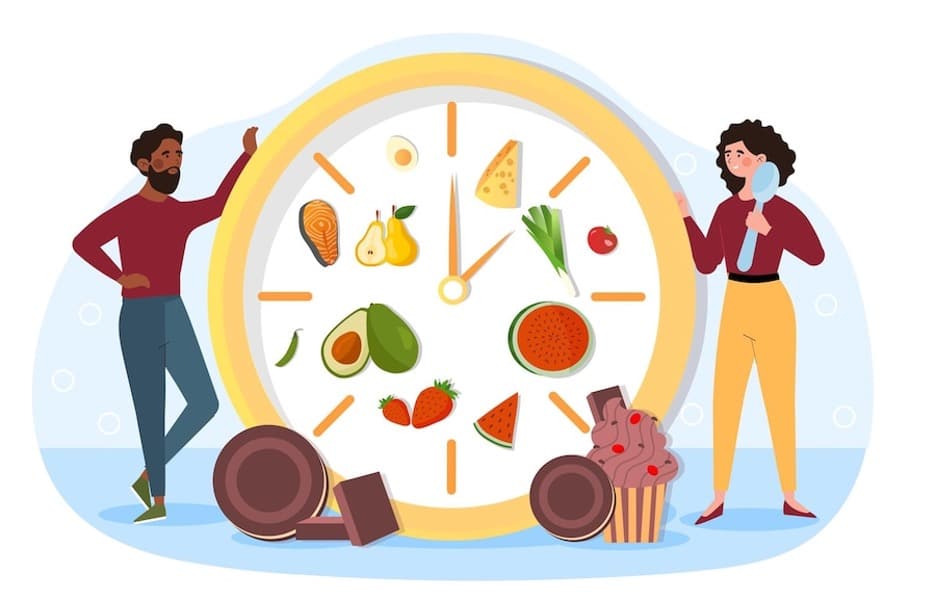Common Diet Myths Debunked & Real Sustainable Eating Habits
Many of us turn to specific eating strategies or diets in the pursuit of weight loss and healthier living. The term “diet” has become so ingrained in our culture that it’s often automatically associated with achieving a healthy lifestyle.
But what if that assumption isn’t true?
In reality, many diets are built on myths and misconceptions that gain popularity without being backed by solid evidence. These diet myths often promise rapid weight loss and miraculous results in just weeks, tempting us with quick fixes that seem like the answer to all our health concerns.
However, most diets are not sustainable or beneficial for our bodies in the long run. Instead of helping, they can lead to frustration, unhealthy eating habits, and even metabolic damage.
Let’s debunk some of the most common diet myths, explore their long-term effects on our bodies, and discover how to build lasting, healthy eating habits that truly support your well-being.
Common Dietary Myths

The first diet myth you need to avoid is that you need to start a “diet” in the first place.
Diets that cut down your meals and whole food groups and promise quick weight loss are generally only helpful for the short term, and do not provide long-term weight loss or weight management success.
This is because your body is limited to calories and consuming only what’s already stored.
However, diets that pay close attention to meal quality, fulfill nutrient requirements, and commit to moderate restriction of unhealthy foods are usually successful.
For example, instead of vowing you’ll never eat deserts and cheeseburgers again, commit to limited and small servings of food that add up to calories.
Even worse, hardcore diets often lead to rapid metabolic adaptations to weight loss, which makes both short and long-term weight loss difficult.
With that being said, here are the top 5 diet myths to avoid:
Diet Myth 1: Don’t Consume Much Salt
The belief that everyone should strictly limit their salt intake is one of the most common diet myths, often leading to misconceptions about its role in our health.
While it’s true that excessive sodium intake can contribute to high blood pressure, heart disease, and other cardiovascular issues in salt-sensitive individuals, the blanket advice to cut out salt isn’t always appropriate for everyone.
Salt plays an essential role in the body, helping regulate fluid balance, muscle function, and nerve signals. For people with active lifestyles or those who follow a whole-food diet that naturally contains less sodium, increasing salt intake can be beneficial for maintaining adequate hydration and optimal electrolyte levels.
In fact, cutting too much salt can lead to issues like muscle cramps, headaches, and fatigue, especially if you’re sweating a lot through exercise.
Rather than eliminating salt completely, the key is to focus on the quality of your diet overall.
Processed foods are the primary source of excessive sodium in most people’s diets, not the salt you add to home-cooked meals.
For most individuals, consuming salt in moderation, particularly from natural sea salt or other mineral-rich sources, is not only safe but necessary for overall health. The focus should be on reducing added sugars and ultra-processed foods, which have a far more detrimental impact on your health than natural salt ever could.
Diet Myth 2: Finish Your Meals Before 7:00 P.M.

The idea that you must stop eating after 7 p.m. to prevent weight gain is a myth, and there’s no magic hour when calories suddenly become more fattening.
What matters more is the overall quality and quantity of your food intake, not the specific time you eat.
However, it’s true that our metabolism tends to slow down in the evening as our activity levels decrease, which can lead to slower digestion, especially if you consume heavy meals late at night.
Eating large portions or meals high in fats and sugars before bed may contribute to discomfort, weight gain, and even disrupt your sleep quality.
Rather than focusing on the clock, aim to eat balanced meals and snacks that support your body’s natural rhythm. If you feel hungry in the evening, choose lighter options like fresh juices made from carrots, celery, or apples, or opt for a salad over calorie-dense foods like cookies, cheeseburgers, or chips.
This approach helps keep your energy stable, supports digestion, and promotes better sleep without unnecessary restrictions on meal timing.
Diet Myth 3: Avoid Snacking
Many people mistakenly believe that snacking is the reason they gain extra pounds, but it’s often not the act of snacking itself—it’s the types of snacks chosen.
When you opt for nutritious options like salads, fresh fruits, vegetables with hummus, nuts and seeds, Greek yogurt, whole grain crackers, oats, smoothies, or air-popped popcorn, snacking can actually be a powerful tool for maintaining energy levels and supporting a healthy lifestyle.
Healthy snacks, like those mentioned above, help curb your hunger and prevent overeating at your main meals. This routine approach to snacking can be a sustainable strategy for weight loss and weight management.
For example, keeping healthy school snacks readily available for kids, such as Hippeas Chickpea Puffs or fresh fruit, can promote better eating habits for the whole family.
For those who enjoy something a bit more indulgent yet are still mindful of health, consider snacks like the Redd Bar or UNREAL chocolate bars.
These choices are designed to be both satisfying and nutritious, allowing you to enjoy a treat without compromising your health goals.
Last update on 2025-04-16 / This article includes affiliate links/Images via Amazon Product Advertising API. I may earn commissions on purchases made through these links.
If you’re looking for something different, CBD gummies have also gained popularity as a health-conscious snack option. Though they can be on the pricier side, using a Galaxy Treats promo code can help you save money while still supporting your wellness journey.
Snacking the right way is all about choosing options that align with your nutritional needs and goals.
Diet Myth 4: Never Eat Foods That Have Gluten

The idea that everyone should avoid gluten is a common misconception. While individuals with Celiac disease or a diagnosed gluten sensitivity must strictly avoid gluten, it’s safe for the vast majority of people.
In fact, gluten-containing grains like whole wheat, barley, and rye are excellent sources of fiber, which plays a crucial role in promoting satiety, regulating blood sugar levels, and supporting healthy digestion.
The gut microbiome—home to trillions of beneficial bacteria—relies on fiber-rich foods as a source of prebiotics.
Prebiotics are compounds that fuel the growth of good bacteria in your gut, contributing to improved digestion, immune function, and even mood regulation. When you exclude gluten without medical need, you may miss out on these essential fibers, which can lead to reduced gut health over time.
While gluten can cause digestive issues in people with sensitivities, it’s generally not a problem for most individuals.
For those concerned about gut health, it’s important to focus on practices that strengthen the gut lining and prevent leaky gut syndrome.
Incorporating fermented foods like yogurt, kefir, and sauerkraut, along with a variety of fiber-rich foods, can support a balanced gut microbiome and promote a healthier digestive system.
Instead of needlessly cutting out gluten, aim to diversify your diet with whole grains and other high-fiber foods that nourish both your body and your gut bacteria. Maintaining a healthy gut is about feeding your beneficial microbes and fortifying your gut barrier, which can help you feel better and reduce the risk of digestive issues.
Diet Myth 5: Eat “Diet” Foods
The concept of “diet foods” or “superfoods” is often misunderstood. No single food will magically lead to weight loss or gain, and labeling foods as inherently “good” or “bad” oversimplifies nutrition.
Instead, think of foods in terms of how often you should consume them based on your individual health goals.
A balanced approach to eating includes a variety of vegetables, fruits, nuts, seeds, whole grains, lean proteins, and dairy foods, creating a diverse and nutrient-rich diet that supports overall health.
While superfood powders have their pros and cons, they can be a convenient way to boost your nutrient intake. For example, I regularly take a superfood powder supplement like Bloom Greens & Superfoods to complement my diet.
These superfood supplements can be beneficial for those who struggle to get enough vitamins and minerals from their daily meals. However, it’s essential to remember that whole foods like fresh fruits, vegetables, lean proteins, and whole animal products are often more nutrient-dense and provide a broader range of health benefits.
Relying on a diet rich in whole foods not only helps you meet your nutritional needs but also supports better digestion, sustained energy, and overall well-being.
Superfood powders can fill gaps in your diet, but they shouldn’t be seen as a replacement for real, whole foods that offer complete nutrition.
Sustainable Weight Loss Tips
Although diets may appear as a fast remedy for weight loss and well-being, they frequently depend on misconceptions and temporary solutions that are not viable in the future.
The faster you lose weight; you are likely to gain that weight very quickly. A healthy guideline is 1 to 2 pounds loss per week. If someone is starving and surviving on little or no meals for body weight loss, it is observed, that those people happen to be weak and face health problems in the longer run.
By prioritizing balance, moderation, and tuning into your body’s needs, a more health-conscious strategy is adopted instead of adhering to strict or fashionable diets.
By handling stress, focusing on adequate sleep, remaining physically active, and selecting food mindfully, we can establish a lifestyle that promotes lasting health. Instead of believing in false diet beliefs, strive for realistic and sustainable habits that nourish your body and mind for long-term health.
Manage Stress
Chronic stress triggers the release of hormones like cortisol, which can lead your body to store more fat, particularly around the abdomen. High cortisol levels also slow down the digestion process and increase cravings for sugary and high-calorie comfort foods like chocolates and candies.
Managing stress through natural techniques such as mindfulness, exercise, or breathing exercises can help regulate these hormones, reduce emotional eating, and support healthier food choices.
Improve Your Sleep Routine
Prioritizing quality sleep is essential for overall health and weight management. Lack of sleep disrupts the balance of hormones like ghrelin and leptin, which regulate hunger and satiety, making you feel hungrier and more prone to overeating.
Poor sleep also affects how efficiently your body digests food, processes nutrients, and converts them into energy.
This can lead to slower metabolism and increased fat storage. Aim for a consistent sleep schedule to keep your body’s systems in harmony, supporting optimal digestion, metabolism, and energy levels.
Exercise Regularly
Day-to-day activities like house chores, cleaning, and cooking are physical activities, but they are not enough. These types of exercise count as nonexercise activity thermogenesis (NEAT) and significantly contribute to weight loss, but there should be some time when you serve yourself with fresh air, relaxation, and observe mindfulness.
Leave your regular place and go to parks, or a sports complex where you walk, stretch, do skipping, or leisurely walk to feel your body doing activity and shedding extra pounds.
Don’t Skip Meals
Skipping meals, especially breakfast, isn’t a sustainable strategy for weight loss or overall health. Breakfast kick-starts your metabolism and provides the energy your body needs to function optimally throughout the day.
By avoiding breakfast or other meals, you’re not giving your body the consistent fuel it requires to burn calories effectively.
Unless you’re intentionally following an intermittent fasting plan, skipping meals can hinder your progress by disrupting your body’s natural hunger cues and leading to unhealthy eating habits.
It prevents you from developing a balanced relationship with food, often causing overeating or cravings later in the day.
Instead, focus on eating a balanced breakfast, moderating your portions at lunch, and keeping your dinner light but satisfying.
Planning a few easy, healthy dinner ideas ahead of time can help ensure you end your day with nourishment, not regret while staying consistent with your goals.
This approach helps you lose weight more effectively while fostering a positive, sustainable connection with food.
Prepare Meals at Home (As Much as Possible)

Cooking at home using whole foods or minimally processed ingredients is one of the best ways to take control of your diet and support your health. Start by making a well-planned grocery store visit to stock up on essential items like a variety of greens, lean proteins, whole grains, and flavorful herbs and spices.
Preparing meals at home allows you to tailor your dishes to your nutritional needs, controlling the amount of oil, calories, and seasonings used while still satisfying your taste preferences.
One of the best kitchen hacks to simplify your week is meal prepping. Preparing your meals in advance saves you a lot of time and reduces the daily stress of deciding what to eat.
With a bit of planning, you can have nutritious, balanced meals ready to go, helping you avoid the temptation of unhealthy takeout or processed foods. Meal prepping not only supports a healthier lifestyle but also helps you stick to your dietary goals while saving money in the long run.
Reduce Added Sugar Intake
Consuming too much added sugar is a significant contributor to health problems like weight gain, obesity, type 2 diabetes, and heart disease.
Unlike natural sugars found in whole foods like fruits and milk, which come bundled with fiber, vitamins, and minerals, added sugars—such as those found in processed foods and sugar syrups—provide empty calories without any nutritional value.
Even small amounts of added sugar can disrupt your metabolism and increase your risk of chronic diseases, making it essential to minimize your intake wherever possible.
Salt, on the other hand, often gets an undeserved bad reputation, primarily because it’s frequently linked with health issues that are actually driven by excessive sugar consumption.
While it’s true that too much sodium can elevate the risk of high blood pressure, heart attack, and stroke, this is often a concern for those who are salt-sensitive.
For the general population, salt plays a critical role in maintaining adequate hydration, supporting nerve function, and ensuring proper electrolyte balance.
In fact, many people actually need more salt to maintain good hydration and prevent electrolyte imbalances, especially if they lead an active lifestyle or follow a diet that limits processed foods.
If you’re salt-sensitive or have been advised to limit sodium, consider enhancing the flavor of your meals with alternatives like a squeeze of lemon, no-salt spice blends, or fresh herbs.
Also, when grocery shopping, look for low-sodium options if you’re specifically trying to reduce your salt intake while still keeping your meals tasty and satisfying.
However, most people should focus on reducing added sugar intake and worry less about intaking too much salt.
Read Next: The Simplest Diet Plan for Weight Loss: Rules You Can Actually Follow!





